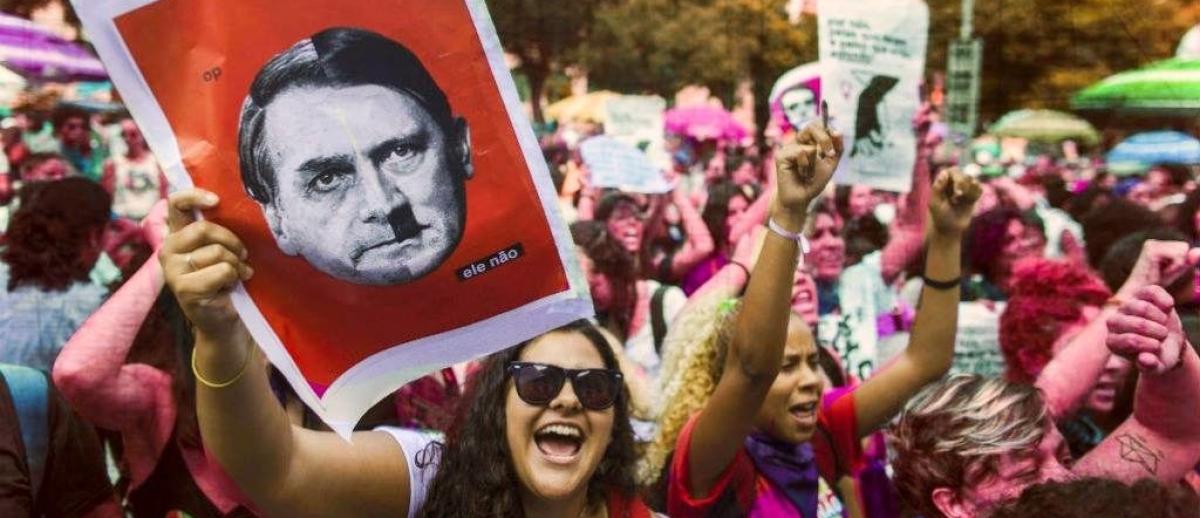Post-Fascism and Human Rights in Brazil: Domestic and Foreign Policy Dimensions
archive


Post-Fascism and Human Rights in Brazil: Domestic and Foreign Policy Dimensions
The decade of the 2010’s is marked by the rise of far right-wing movements that have been gaining ground around the world, not only electing representatives in national parliaments, but also by placing authoritarian figures in key political positions. Narratives preaching intolerance against minorities, ultra-nationalism, xenophobia, authoritarianism and religious fundamentalism are some of the factors that distinguish this political phenomenon, which inevitably arouses memories of fascism—even though its populist leaders are elected and dominate democratic institutions rather than construct totalitarian states. The concept of post-fascism (see Traverso 2019) builds on the idea that, despite the differences between the fascism of the 20th century and the current phenomenon of far-right renaissance and authoritarian nationalism, it is undeniable that there is historical continuity between the two manifestations. This essay will place Brazil’s post-fascist form of populist authoritarianism in the context of this series, and introduce an analysis of its foreign policy dimensions.
How does Jair Bolsonaro’s administration in Brazil fit in the post-fascism paradigm and the broader phenomenon of authoritarian populism? First of all, it is important to point out that although some of the characteristics of a post-fascist regime gained ground in Brazil during the Michel Temer (2016-2018) government, Bolsonaro’s election officially appropriated them into the government’s narrative (Goldstein, 2019). The relevance of analyzing issues regarding human rights is especially important in this regard, as these rights are “the first victim” in times of political crisis (Alnajjar, 2001: 188). Actions by the Bolsonaro administration during his first six months in government reinforce this perception. The first measure signed by the president removed all measures aimed at guaranteeing the rights of LGBTQ+ groups from Brazilian domestic human rights policy. In addition, a parliamentary measure (“MP180”) was approved that allows the monitoring of non-governmental organizations. Abuse of force by the police has been defended, the rights of the victims of crimes committed by the military dictatorship have been curtailed, and there has been anti-human rights rhetoric by high-level authorities, most notably by the president himself.1
Furthermore, Brazil fits the pattern of our previous cases of Turkey, Israel, and Hungary as rising domestic authoritarianism spills over into foreign policy—as noted by Shafir’s notion of the “authoritarian international.” Research suggests a correlation between a state's domestic human rights efforts and the international human rights activities of its governments (Merke; Pauselli, 2013). Brazilian foreign policy under Bolsonaro is highly influenced by the preferences of the far-right and conservative coalition that brought the president to power, notably evangelicals. And in Brazil’s case, there has been a decline on both the foreign and domestic fronts.
In a direct foreign policy connection that marks this new authoritarian alliance, for the first time, Brazilian diplomacy of the Bolsonaro administration has opposed a recent UN Human Rights Council resolution that condemned the Israeli government for rights violations committed during conflicts in Gaza in 2018 (in which international organizations concluded that Israeli soldiers killed at least 189 unarmed Palestinian protesters) and the occupation of the Golan Heights. The US also voted against the resolution, although supporting documentation indicates that the violations may constitute crimes against humanity.2 Indeed, the Bolsonaro administration’s approach to Tel Aviv is directly related to its desire to maintain its alignment with the US and Donald Trump. Brazil’s position reveals a policy double standard: collusion with allies and incrimination of governments considered enemies (like the Venezuelan regime, for example), but no concern for human rights. Moreover, the abandonment of a conflict mediation policy for one that openly supports a violating country illustrates the ideological motivations of Brazilian foreign policy on human rights.
At the regional level, Bolsonaro has made statements denying crimes committed not only by the Brazilian military regime, but also the dictatorships of some of its South American neighbors. During Dilma Rousseff's impeachment vote in 2016, Bolsonaro honored Brilhante Ustra, the military officer responsible for Rousseff's torture during the dictatorship. As president, in March 2019 Bolsonaro ordered the Ministry of Defense to celebrate the anniversary of the military coup.3 He also shocked neighboring countries by honoring and praising South American dictators Alfredo Stroessner of Paraguay and Augusto Pinochet of Chile.4 By honoring dictators who have kidnapped, imprisoned, tortured, and murdered thousands of people, Bolsonaro demonstrates not just lack of empathy with the families of the victims of these dictatorships, but his disregard for human rights.
Brazil fits the pattern of our previous cases of Turkey, Israel, and Hungary as rising domestic authoritarianism spills over into foreign policy.
Like the Philippines, Brazil’s authoritarian turn has a special impact on women’s rights—in this case, projected internationally. In July 2019, one of the biggest changes in Brazilian foreign policy vocabulary so far was reported: Brazil argued that the term “gender” should be abolished from UN resolutions. Brazilian foreign policy now claims that biological gender is what will be considered by the country in international negotiations. The change was noted, for example, in the base text that the Brazilian government proposed for a mandate at the United Nations Human Rights Council. The document does not mention the word “gender” at all, and the term “sexual and reproductive rights” was removed, as were references to the promotion of LGBTQ+ rights. Nor was combating torture mentioned. Bolsonaro stated that Brazil's agenda in the UN Human Rights Council is “based on the strengthening of family structures and the exclusion of references to gender.” Experts point to a setback in terms of human rights in Brazilian foreign policy, and the Brazilian National Human Rights Council has not endorsed the document delivered to the UN proposing the country’s mandate.5
From this brief analysis of a few key international human rights positions of the Bolsonaro government, it can be inferred that Brazilian foreign policy is characterized not only as anti-rights, but also strongly influenced by post-fascist ideas and is bounded by ideological preferences rather than strategic concerns. Bolsonaro was elected thanks to a Brazilian post-fascist discourse that demonizes the left, weakens democratic institutions, takes advantage of post-truth narratives, and rejects the promotion of minority rights. Its foreign policy has not deviated from this path. Brazil’s anti-rights narrative undermines the country's image internationally, may affect strategic alliances and cooperation agreements, and labels Brazil as an undemocratic country that has little concern for the promotion of human rights, domestically or in the world.This could have damaging consequences for Brazil by isolating the country at the multilateral level, leading to the distrust of the international community. While future research should investigate how these consequences will affect Brazilian foreign policy in the long term, this global-e series helps us to expand the comparative analysis of authoritarian populism and the impact of post-fascism on human rights foreign policy.
1. Amnesty International. Discurso da administração de Bolsonaro contra direitos humanos começa a se concretizar em medidas nos primeiros meses de governo. 21 May 2019. Available at http://bit.ly/2kKliWP (26 February 2020). ROLIM, Rivali. Os direitos humanos – Bolsonaro, 100 dias. Diplomatique, 10 Apr 2019. Available at http://bit.ly/2kik5FY (26 February 2020).
2. OPERA MUNDI. Brasil vota pela primeira vez contra Palestina em Conselho de Direitos Humanos da ONU. 22 March 2019. Available at http://bit.ly/2lUyetC (23 July 2019). ESTADÃO. Na ONU, Brasil apoia Israel em questões referentes ao Golan. 22 March 2019. Available at http://bit.ly/2lQj9Jm (23 July 2019).
3. Pinto, Juliana (2019). Para que nunca mais aconteça: memória e direitos humanos na Argentina e no Brasil. Boletim Neaape, v.03 n.01, p.12-19.
4. Carmo, Marcia. Bolsonaro no Chile: como visita de presidente do Brasil está dividindo país. BBC, 22 March 2019. Available at https://bbc.in/2mdOIgk (27 July 2019); EFE. Governo paraguaio “respeita” homenagem de Bolsonaro a ditador. Exame, 28 February 2019. Available at http://bit.ly/2kNQbtx (27 July 2019).
5. Gravia, Geovanna. Sem menção a gênero e a tortura, Brasil apresenta documento de candidatura a conselho da ONU. G1, 11 July 2019. Available at https://glo.bo/2knhpXO (29 July 2019). Chade, Jamil. O Brasil ao lado das ditaduras mais cruéis do mundo. El País, 20 July 2019. Available at http://bit.ly/2kNefMX (29 July 2019).
Alnajjar, Ghanim (2001). “Human Rights in a Crisis Situation: The Case of Kuwait after Occupation.” Human Rights Quarterly, Vol. 23, No. 1, pp.188-209.
Amnesty International. Discurso da administração de Bolsonaro contra direitos humanos começa a se concretizar em medidas nos primeiros meses de governo. 21 May 2019. Available at http://bit.ly/2kKliWP (26 February 2020). Rolim, Rivali. Os direitos humanos – Bolsonaro, 100 dias. Diplomatique, 10 Apr 2019. Available at http://bit.ly/2kik5FY (26 February 2020).
Carmo, Marcia. Bolsonaro no Chile: como visita de presidente do Brasil está dividindo país. BBC, 22 March 2019. Available at https://bbc.in/2mdOIgk (27 July 2019).
Chade, Jamil. O Brasil ao lado das ditaduras mais cruéis do mundo. El País, 20 July 2019. Available at http://bit.ly/2kNefMX (29 July 2019).
EFE. Governo paraguaio “respeita” homenagem de Bolsonaro a ditador. Exame, 28 February 2019. Available at http://bit.ly/2kNQbtx (27 July 2019).
ESTADÃO. Na ONU, Brasil apoia Israel em questões referentes ao Golan. 22 March 2019. Available at http://bit.ly/2lQj9Jm (23 July 2019).
Goldstein, Ariel Alejandro (2019). “The New Far-Right in Brazil and the Construction of a Right-Wing Order.” Latin American Perspectives, p.1–18.
Gravia, Geovanna. Sem menção a gênero e a tortura, Brasil apresenta documento de candidatura a conselho da ONU. G1, 11 July 2019. Available at https://glo.bo/2knhpXO (29 July 2019).
Merke, Federico; Pauselli, Gino (2013). Foreign Policy and Human Rights Advocacy: An Exercise in Measurement and Explanation. Hum Rights Review, No.14, p.131–155.OPERA MUNDI. Brasil vota pela primeira vez contra Palestina em Conselho de Direitos Humanos da ONU. 22 March 2019. Available at http://bit.ly/2lUyetC (23 July 2019). ESTADÃO. Na ONU, Brasil apoia Israel em questões referentes ao Golan. 22 March 2019. Available at http://bit.ly/2lQj9Jm (23 July 2019).
Pinto, Juliana (2019). Para que nunca mais aconteça: memória e direitos humanos na Argentina e no Brasil. Boletim Neaape, v.03 n.01, p.12-19.
Traverso, Enzo (2019). The New Faces of Fascism: Populism and the Far Right. Verso.



